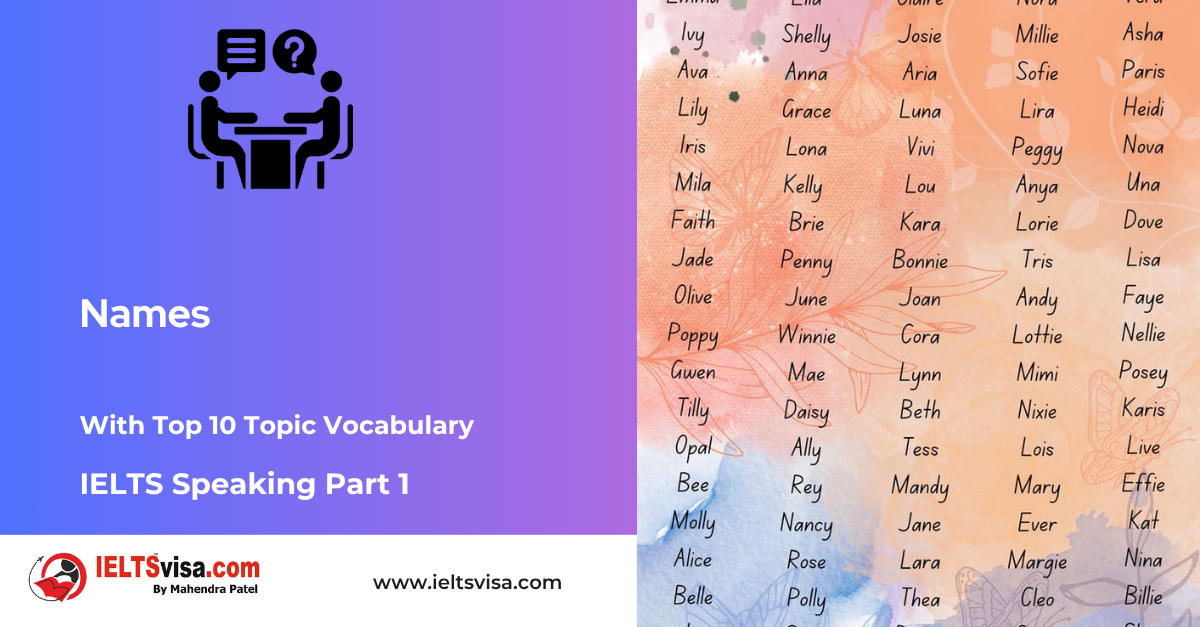IELTS Speaking Part 1 – Names
IELTS Speaking Practice
IELTS Speaking Part 1 – Names
Examiner: How did your parents choose your name?
Candidate: There are a few possibilities for how my parents chose my name. Maybe they had a family tradition of naming children after historical figures, liked the sound of the name, or chose a name with a specific meaning. Unfortunately, I don’t have personal memories of that time!
Examiner: Is your name common or unusual in your country?
Candidate: My name is (common/unusual) in my country. I (often/rarely) meet other people with the same name.
Examiner: If you could change your name, would you? (Why/Why not?)
Candidate: I (would/wouldn’t) necessarily change my name. I’ve grown accustomed to it, which feels like a part of my identity. However, if I could choose, I might consider a name with a specific meaning or unique sound.
Examiner: Did your family have a particular nickname for you when you were a child?
Candidate: Yes, many families have nicknames for their children. My family used to call me (mention your childhood nickname), which was likely a shortened version of my name or a term of endearment.
Examiner: Are there any interesting traditions or customs related to naming children in your culture?
Candidate: There are some fascinating traditions in my culture related to naming children. For example, naming children after deities, consulting with elders for name suggestions, or giving children multiple names.
Examiner: Do you think a person’s name can influence their personality?
Candidate: This is an interesting question! There’s no definitive answer, but some believe a person’s name can subconsciously influence their personality traits or how others perceive them. However, I think personality is shaped by a combination of factors beyond just a name.
Examiner: Have you ever met someone with a name that you found particularly interesting?
Candidate: Yes, I have! Once, I met someone with a name (mention the interesting name). I found it interesting because it was a historical name, had a unique meaning, or came from a different culture.
Examiner: In your opinion, what makes a good name?
Candidate: A good name is subjective, but for me, it should ideally be easy to pronounce and remember, have a positive meaning, and reflect the cultural background. Ultimately, a good name is one that the person carrying it feels comfortable and confident with.
Examiner: Do you think it’s important to learn how to pronounce names correctly?
Candidate: Absolutely! Taking the time to learn how to pronounce someone’s name correctly demonstrates respect and shows you care. It can also make them feel valued and included.
Examiner: Have you ever struggled to pronounce someone’s name?
Candidate: I have struggled to pronounce someone’s name before. If I’m unsure, I always politely ask the person how to say their name correctly. Most people are happy to help with pronunciation.
Examiner: Do parents in your culture typically choose names with meanings in mind?
Candidate: Many parents in my culture prioritize names with meanings. They might choose names that represent strength, virtue, or good fortune or hold significance in their religion or cultural heritage. The meaning behind a name can be a source of pride and personal connection for the individual.
Examiner: Are there any superstitions or beliefs in your culture associated with names?
Candidate: There might be some! Some cultures believe certain names bring good luck or prosperity, while others might avoid names associated with negative connotations. These beliefs can influence parental choices when naming their children.
Examiner: Have you ever changed your name or considered doing so legally?
Candidate: No, I haven’t personally changed my name legally. However, some people choose to do so for various reasons, such as adoption, marriage, or a preference for a different cultural identity.
Examiner: Do you think nicknames can be just as important as a person’s given name?
Candidate: Absolutely! Nicknames can become an important part of someone’s identity, especially in close-knit circles of friends and family. Nicknames can be endearing, reflect shared experiences, or simply be a shorter, more familiar way to address someone.
Examiner: In your opinion, how does a person’s name shape the way they interact with the world?
Candidate: A person’s name can influence their interactions in a few ways. Suppose they have a name that’s often mispronounced or difficult to remember. In that case, they might need to be more assertive in correcting others. A unique name can sometimes spark conversation or make a lasting impression. Ultimately, a person’s confidence and comfort with their name likely play a more significant role in shaping their interactions than the name itself.
Top 10 Topic Vocabulary for “Names”
|
Vocabulary |
Type |
Meaning |
Synonyms |
Antonyms |
Word Family |
Example Sentences |
|
Nickname |
Noun |
A familiar or humorous name given to a person or thing |
Moniker, Sobriquet |
Formal name |
Nickname (verb) |
My family used to call me by my nickname, a term of endearment. |
|
Tradition |
Noun |
A long-established custom or belief passed down through generations |
Custom, Practice |
Innovation |
Traditional (adj), Traditionally (adv) |
My culture has many naming traditions, like consulting elders for suggestions. |
|
Meaning |
Noun |
What is meant by a word, text, concept, or action |
Significance, Connotation |
Nonsense |
Meaningful (adj), Meaningless (adj) |
Parents often choose names with special meanings, like virtues or good fortune. |
|
Influence |
Verb/Noun |
The capacity to have an effect on the character, development, or behaviour of someone or something |
Impact, Effect |
Insignificance |
Influential (adj), Influenced (adj) |
Some believe that names can influence personality traits. |
|
Identity |
Noun |
The fact of being who or what a person or thing is |
Self, Individuality |
Anonymity |
Identify (verb), Identifiable (adj) |
A name can be a significant part of one’s identity. |
|
Pronounce |
Verb |
To make the sound of a word or letter in a particular way |
Articulate, Enunciate |
Mispronounce |
Pronunciation (noun), Pronounceable (adj) |
It’s important to pronounce names correctly to show respect. |
|
Custom |
Noun |
A traditional and widely accepted way of behaving or doing something |
Tradition, Practice |
Innovation |
Customary (adj), Customarily (adv) |
Naming customs in my culture often involve religious or cultural significance. |
|
Subconscious |
Adjective |
Concerning the part of the mind of which one is not fully aware |
Subliminal, Hidden |
Conscious |
Subconsciously (adv), Subconsciousness (noun) |
Some people believe names can subconsciously influence a person’s character. |
|
Heritage |
Noun |
Valued objects and qualities such as cultural traditions that have been passed down from previous generations |
Legacy, Inheritance |
Ignorance |
Hereditary (adj) |
Names can reflect cultural heritage and carry significant meanings from past generations. |
|
Endearing |
Adjective |
Inspiring affection |
Charming, Lovable |
Unattractive |
Endear (verb), endearment (noun) |
Nicknames can be endearing and reflect close relationships. |

Our Books
Master IELTS Speaking Part 1
IELTS Writing Task 1 Book
IELTS Writing Task 2 Book
Practice IELTS Other Modules
IELTS Listening
The IELTS Listening test assesses how well you can understand spoken English in various contexts. It lasts about 30 minutes and is divided into four sections with a total of 40 questions. The listening tasks become increasingly difficult as the test progresses.
IELTS Academic Reading
The IELTS Academic Reading section assesses your ability to understand and interpret a variety of texts in academic settings. It is designed to evaluate a range of reading skills, including skimming for gist, reading for main ideas, reading for detail, understanding inferences, and recognizing a writer's opinions and arguments.
IELTS Speaking
The IELTS Speaking test assesses your ability to communicate in English on everyday topics. It lasts 11-14 minutes and consists of three parts: introduction, cue card, and a discussion based on the cue card topic.
IELTS General Reading
IELTS General Reading tests your ability to understand and interpret various types of texts. Here are some key areas and types of content you can expect to encounter in the reading section, along with tips for effective preparation.
IELTS Academic Writing Task 1
In IELTS Academic Writing Task 1, you are presented with a visual representation of information, such as graphs, charts, tables, or diagrams, and you are required to summarize, compare, or explain the data in your own words.
IELTS General Writing Task 1
In IELTS General Writing Task 1, you are required to write a letter based on a given situation. The letter can be formal, semi-formal, or informal, depending on the prompt. Here’s a breakdown of the key components to include in your letter
IELTS Academic Writing Task 2
In IELTS Academic Writing Task 2, you are required to write an essay in response to a question or topic. Here’s a guide to help you understand the essential elements of this task
IELTS Exam Tips
To succeed in the IELTS exam, practice regularly, familiarize yourself with the test format, improve your vocabulary, develop time management skills, and take mock tests to build confidence.
Grammer for IELTS
Grammar is the foundation of effective communication in English. Understanding tense usage, subject-verb agreement, and sentence structure enhances clarity and coherence in writing and speaking.
Vocabulary for IELTS
Vocabulary plays a crucial role in the IELTS (International English Language Testing System) exam, especially in the Speaking and Writing sections. Here’s an overview of why vocabulary is important and how it impacts your performance
RECENT IELTS SAMPLES QUESTIONS AND ANSWERS
IELTS Speaking Part 1 – Internet
IELTS Speaking Part 1 - Internet Examiner: Do you use the Internet? Candidate: Absolutely! The Internet has...
IELTS Speaking Part 1 – Leisure Time
IELTS Speaking Part 1 - Leisure Time Examiner: How do you usually spend your leisure time? Candidate: I enjoy...
IELTS Speaking Part 1 – Mirrors
IELTS Speaking Part 1 - Mirrors Examiner: Do you often look at yourself in the mirror?Candidate: I often look...
IELTS Speaking Part 1 – Mobile Phones
IELTS Speaking Part 1 - Mobile Phones Examiner: Do you have a mobile phone? Candidate: Absolutely! Mobile...
IELTS Speaking Part 1 – Museum
IELTS Speaking Part 1 - Museum Examiner: Do you like visiting museums?Candidate:Absolutely! Museums offer a...
IELTS Speaking Part 1 – Music
IELTS Speaking Part 1 - Music Examiner: Do you like listening to music?Candidate: Yes, I love listening to...













